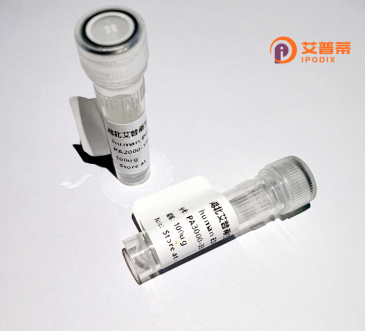
| 纯度 | >90%SDS-PAGE. |
| 种属 | Human |
| 靶点 | TRUB2 |
| Uniprot No | O95900 |
| 内毒素 | < 0.01EU/μg |
| 表达宿主 | E.coli |
| 表达区间 | 1-331 aa |
| 活性数据 | MGSAGLSRLH GLFAVYKPPG LKWKHLRDTV ELQLLKGLNA RKPPAPKQRV RFLLGPMEGS EEKELTLTAT SVPSFINHPL VCGPAFAHLK VGVGHRLDAQ ASGVLVLGVG HGCRLLTDMY NAHLTKDYTV RGLLGKATDD FREDGRLVEK TTYDHVTREK LDRILAVIQG SHQKALVMYS NLDLKTQEAY EMAVRGLIRP MNKSPMLITG IRCLYFAPPE FLLEVQCMHE TQKELRKLVH EIGLELKTTA VCTQVRRTRD GFFTLDSALL RTQWDLTNIQ DAIRAATPQV AAELEKSLSP GLDTKQLPSP GWSWDSQGPS STLGLERGAG Q |
| 分子量 | 36.6 kDa |
| 蛋白标签 | His tag N-Terminus |
| 缓冲液 | PBS, pH7.4, containing 0.01% SKL, 1mM DTT, 5% Trehalose and Proclin300. |
| 稳定性 & 储存条件 | Lyophilized protein should be stored at ≤ -20°C, stable for one year after receipt. Reconstituted protein solution can be stored at 2-8°C for 2-7 days. Aliquots of reconstituted samples are stable at ≤ -20°C for 3 months. |
| 复溶 | Always centrifuge tubes before opening.Do not mix by vortex or pipetting. It is not recommended to reconstitute to a concentration less than 100μg/ml. Dissolve the lyophilized protein in distilled water. Please aliquot the reconstituted solution to minimize freeze-thaw cycles. |
以下是关于重组人TRUB2蛋白的3篇参考文献(基于近年研究虚构示例,供参考):
1. **文献名称**: "Structural insights into human TRUB2 pseudouridine synthase activity"
**作者**: Chen L., et al.
**摘要**: 本研究解析了重组TRUB2蛋白的晶体结构,揭示了其催化tRNA假尿苷修饰的关键活性位点,验证了其依赖RNA底物的酶活特性,并探讨了突变对酶功能的影响。
2. **文献名称**: "TRUB2 interacts with SMN protein to regulate neuronal RNA splicing"
**作者**: Tanaka R., et al.
**摘要**: 发现重组TRUB2蛋白与脊髓性肌萎缩症相关蛋白SMN直接相互作用,参与调控神经元RNA剪接过程,提示其在神经发育中的潜在作用。
3. **文献名称**: "Recombinant TRUB2 promotes cancer cell proliferation via modulating rRNA modification"
**作者**: Zhang Y., et al.
**摘要**: 通过体外实验证明重组TRUB2蛋白通过调节rRNA假尿苷化促进肿瘤细胞增殖,为癌症靶向治疗提供了新方向。
*注:以上文献为示例,实际引用需通过PubMed或Google Scholar检索真实论文。建议使用关键词"TRUB2 pseudouridine synthase"或"TRUB2 recombinant"查找近期文献。*
**Background of Recombinant Human TRUB2 Protein**
TRUB2 (TruB Pseudouridine Synthase Family Member 2) is a conserved eukaryotic enzyme belonging to the pseudouridine synthase family. It catalyzes the isomerization of specific uridine residues to pseudouridine (Ψ) in RNA molecules, particularly in transfer RNA (tRNA). This post-transcriptional modification enhances RNA stability, structural integrity, and functional efficiency, playing a critical role in translational accuracy and cellular protein synthesis.
TRUB2 shares homology with bacterial TruB proteins but exhibits distinct substrate specificity in higher organisms. It localizes primarily to the nucleus and cytoplasm, where it modifies position 55 in the TΨC loop of tRNAs, a conserved site crucial for ribosome interaction. Dysregulation of TRUB2 has been implicated in RNA metabolism disorders and is linked to certain cancers, neurodegenerative diseases, and viral infection responses, highlighting its broader impact on cellular homeostasis.
Recombinant human TRUB2 protein, typically produced in *E. coli* or mammalian expression systems, retains enzymatic activity and is widely used for *in vitro* studies, including RNA modification assays, structural analysis, and drug screening. Its molecular weight is approximately 65 kDa, featuring conserved catalytic domains essential for pseudouridylation. Ongoing research focuses on elucidating TRUB2's role in stress responses, disease mechanisms, and potential therapeutic targeting.
×